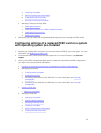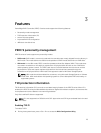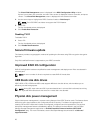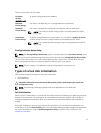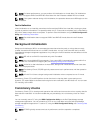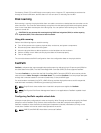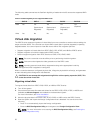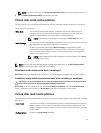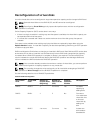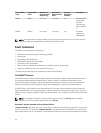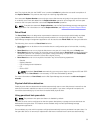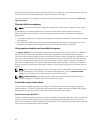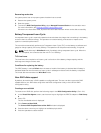
NOTE: For more information on Foreign Configuration View, see Foriegn Configuration View.
5. Exit the BIOS Configuration Utility and reboot the system.
Virtual disk write cache policies
The write cache policy of a virtual disk determines how the controller handles writes to the virtual disk.
The write cache policies are:
Write-Back The controller sends a data transfer completion signal to the host when the
controller cache has received all the data in a transaction. The controller then
writes the cached data to the storage device in the background.
NOTE: The default cache setting for virtual disks is Write-Back caching.
Write-Through The controller sends a data transfer completion signal to the host system when the
disk subsystem has received all the data in a transaction.
All RAID volumes are presented as Write-Through to the operating system
(Windows and Linux) independent of the actual write cache policy of the virtual
disk. The PERC cards manage the data in cache independently of the operating
system or any applications.
NOTE: Certain data patterns and configurations perform better with a Write-
Through cache policy.
NOTE: Use the Dell OpenManage storage management application or the BIOS Configuration
Utility to view and manage virtual disk cache settings.
Conditions under which write-back is employed
Write-Back caching is used under all conditions in which the battery is present and in good condition.
Conditions under which forced write-back with no battery is employed
CAUTION: It is recommended that you use a power backup system when forcing Write-Back to
ensure there is no loss of data if the system suddenly loses power.
Write-Back mode is available when you select Force WB with no battery. When Forced Write-Back
mode is selected, the virtual disk is in Write-Back mode even if the battery is not present.
Virtual disk read cache policies
The read policy of a virtual disk determines how the controller handles reads to that virtual disk. The read
policies are:
Read Ahead Allows the controller to read sequentially ahead of requested data and to store the
additional data in cache memory, anticipating that the data is required soon. This
speeds up reads for sequential data, but there is little improvement when accessing
random data.
No Read Ahead Disables the Read-Ahead capability.
31



